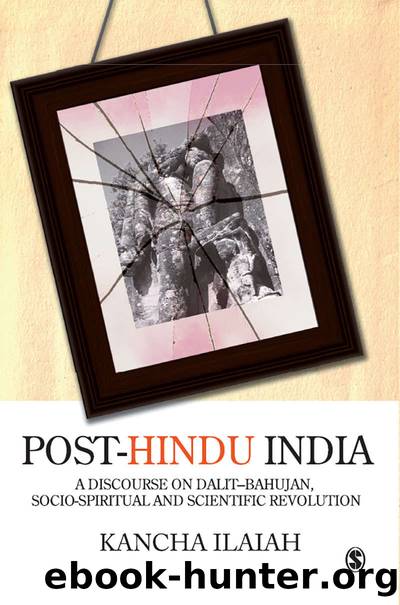Post-Hindu India by Kancha Ilaiah

Author:Kancha Ilaiah [Ilaiah, Kancha]
Language: eng
Format: epub
Publisher: SAGE Publications
Published: 2009-11-16T18:30:00+00:00
THE PHILOSOPHY OF TILLING
Once this truth was recognized as a scientific truth, the efforts to till the land began. The philosophy of tilling the land was treated by Brahmanism as a mundane subject, not even worth discussing. It was not considered to be âknowledgeâ, but a part of Shudratwamâwork of production, unworthy of consideration in the philosophical realm. But tilling the land is not a mundane task of unworthy beings; it is but a task of constructing philosophy itself. This philosophy of production is the most profound philosophy that the humans have ever constructed. The life cycle of human beings depended on this philosophical basis. Though the philosophy of food production, has its roots in food consumption, once the production started it went beyond the level of mere consumption that the Brahmans understand. Step by step it lead to the process of social development. The Shudra notion of development has an inherent belief in the equality of all productive beingsâthis is where it stands in opposition to Brahmanism.
The relationship between the philosophy of tilling and the translation of that philosophy into an action is a dialectical relationship. When Gautama Buddha first saw the tilling of land by bulls pulling a wooden plough, he could not believe that such a technological process could operate before his eyes. It was an unknown wonder for him. In his childhood, the tribal republics survived only on podu production of grain. The transformation of the production process from podu production to plough production was a major revolutionary transformation. This revolution was taking place in the childhood days of the Buddhaâfor the youth of that generation, the process of tilling by bull was a more miraculous revolution than the computer revolution of the late twentieth century. The Brahmans of India refuse to record the greatness of the Shudra social productivity that has driven the vehicle of knowledge to the logical end of developing the knowledge of tilling. The knowledge of tilling was the first historical knowledge that saw the transformability of earth and nature into a humanly usable system within a limited span of time. They achieved this transformation with their own labour. It was in this process of tilling and seeding that the human being realized his/her humanness and the worth of a being.
The scientific process of tilling the land not only centred around the construction technological instruments like the plough, the yoke, leather ropes, iron rods, the spade, the axe, and so on, but also went beyond that knowledge system. The translation of the knowledge of technology into the praxis of production was a historic achievement of the Shudras. This praxis of production was not an easy, mundane process. It was linked to the skills of handling technological instruments which play with the life of the cattle and the humans who handled that system. The cattle faced very dangerous leg injuries (kaalu karru) with the karru hitting their leg on account of indiscipline. Injuries could also happen when the animals were indisciplined and kept running here and there with the yoke on their neck.
Download
This site does not store any files on its server. We only index and link to content provided by other sites. Please contact the content providers to delete copyright contents if any and email us, we'll remove relevant links or contents immediately.
| Africa | Americas |
| Arctic & Antarctica | Asia |
| Australia & Oceania | Europe |
| Middle East | Russia |
| United States | World |
| Ancient Civilizations | Military |
| Historical Study & Educational Resources |
The Bomber Mafia by Malcolm Gladwell(1180)
Submerged Prehistory by Benjamin Jonathan; & Clive Bonsall & Catriona Pickard & Anders Fischer(1162)
Facing the Mountain by Daniel James Brown(1131)
The Dawn of Everything by David Graeber & David Wengrow(1103)
The Way of Fire and Ice: The Living Tradition of Norse Paganism by Ryan Smith(1032)
Wandering in Strange Lands by Morgan Jerkins(1014)
Tip Top by Bill James(1002)
Driving While Brown: Sheriff Joe Arpaio Versus the Latino Resistance by Terry Greene Sterling & Jude Joffe-Block(1001)
Evil Geniuses: The Unmaking of America: A Recent History by Kurt Andersen(999)
Red Roulette : An Insider's Story of Wealth, Power, Corruption, and Vengeance in Today's China (9781982156176) by Shum Desmond(997)
F*cking History by The Captain(966)
It Was All a Lie by Stuart Stevens;(940)
White House Inc. by Dan Alexander(904)
Evil Geniuses by Kurt Andersen(901)
Treasure Islands: Tax Havens and the Men who Stole the World by Nicholas Shaxson(879)
American Dreams by Unknown(857)
American Kompromat by Craig Unger(847)
The Fifteen Biggest Lies about the Economy: And Everything Else the Right Doesn't Want You to Know about Taxes, Jobs, and Corporate America by Joshua Holland(816)
The First Conspiracy by Brad Meltzer & Josh Mensch(811)
